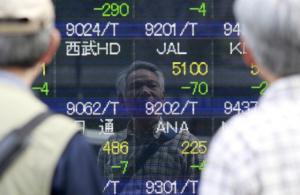Japan's stock market seen falling further on corporate tax s
Japan's stronger-than-expected first-quarter economic growth data last week did little to help the stock market

Japan's stronger-than-expected first-quarter economic growth data last week did little to help the stock market
Bareksa.com - Japanese shares are set to extend their slide in coming weeks as investors doubt Prime Minister Shinzo Abe will announce any aggressive new reforms as part of an updated economic strategy next month.
The biggest drag on the Japanese stock market, now the most expensive in Asia, is the absence of clarity on when the ruling government will cut taxes for businesses, and by how much.
Japan's Nikkei stock index was one of the world's top performers in 2013, surging 57 percent on optimism that Abe's three-pronged recovery recipe would lift the economy out of years of stagnation and falling prices.
Promo Terbaru di Bareksa
The first two arrows of this 'Abenomics' policy, namely ultra-easy monetary policy and generous government spending, drove shares up last year.
However, Abe's third arrow of structural reforms in areas of labour, agriculture and taxes have been slow in coming and sparse on detail. Stock market investors have for months been waiting in the hope that Abe will fulfill a pledge to make tax rates internationally competitive.
Meanwhile, last year's rally in the Nikkei has been followed by a long spell of selling by investors to book their profits. The yen's depreciation, which gave export firms a big earnings boost last year, has also stalled, taking away support for the Nikkei.
"Everything else is a nice to have, but what works to boost earnings per share directly is cutting the corporate tax," said Jesper J Koll, director of equity research at JPMorgan.
The wait has been long. Abe first spoke about his plans to pursue further reforms to corporate taxation at the World Economic Forum in Davos, Switzerland, in January this year.
The ruling Liberal Democratic Party has a draft proposal on the subject, which was seen by Reuters on Tuesday. That report recommends the government spell out the timing and target of the corporate tax cut to help domestic and foreign firms in their decisions on investment and employment.
Yet, the government has to keep in mind Japan's massive fiscal deficit, which would be under further pressure if taxes are cut.
Japan's effective corporate income tax rate, consisting of national and local taxes, stands at around 34.62 percent, exceeding levels of around 30 percent in Germany, 25 percent in China and 17 percent in Singapore.
"The time for talk is over, you need numbers now, numerical targets," Koll said, referring to the tax.
THE YEN FACTOR
The Nikkei has shed 13 percent this year, and analysts suspect those losses could hit 20 percent soon. It closed off 0.2 percent at 14,042 points on Wednesday.
Japan's stronger-than-expected first-quarter economic growth data last week did little to help the stock market as investors remained wary about how the April rise in the sales tax will affect the economy.
The yen meanwhile has stalled between 101 and 104 to a dollar this year, supported by a return to its safe-haven status.
Its failure to fall further against the dollar has also been on account of market perception that the Bank of Japan is unlikely to ease policy further in a hurry, while the U.S. Federal Reserve is a shade more dovish on policy.
Bank of Japan Governor Haruhiko Kuroda has dispelled market expectations that it may ease policy further in the near-term by repeating his optimism that the economy will recover strongly enough to meet the bank's 2 percent inflation target.
"Kuroda has stayed consistent in making his point. He has no intention of using monetary easing to weaken the yen or support the market, but it's also true that there is a gap between his policy and the market expectations," said Hisae Toews, investment director at Fidelity Worldwide Investment in Japan.
That policy view, analysts said, was also the reason Japanese stocks now have lower weighting in Morgan Stanley's global indices.
Equity index provider MSCI is adding three Japanese stocks but removing 12 small companies from the MSCI Global Standard Indexes. MSCI said it will at the same time add 11 U.S. stocks and delete three U.S. stocks.
"When there is a yawning gap between performances of Japanese shares and U.S. shares, MSCI cannot just stand there watching so it had to trim Japan weighting," said Eiji Kinouchi, senior strategist at Daiwa Securities (Source : Reuters)
Pilihan Investasi di Bareksa
Klik produk untuk lihat lebih detail.
| Produk Eksklusif | Harga/Unit | 1 Bulan | 6 Bulan | YTD | 1 Tahun | 3 Tahun | 5 Tahun |
|---|---|---|---|---|---|---|---|
Trimegah Dana Tetap Syariah Kelas A | 1.385,6 | ||||||
Trimegah Dana Obligasi Nusantara | 1.095,56 | - | |||||
STAR Stable Amanah Sukuk autodebet | 1.085,51 | - | - | ||||
Capital Fixed Income Fund autodebet | 1.854,58 | ||||||
Insight Renewable Energy Fund | 2.288,82 |

Produk Belum Tersedia
Ayo daftar Bareksa SBN sekarang untuk bertransaksi ketika periode pembelian dibuka.

Produk Belum Tersedia
Ayo daftar Bareksa SBN sekarang untuk bertransaksi ketika periode pembelian dibuka.